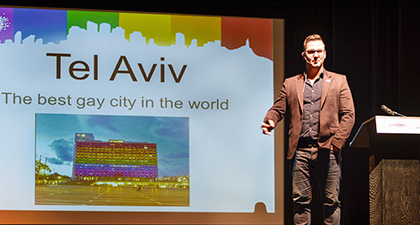TORONTO — A Yom Ha’atzmaut event featuring an eclectic panel of Israeli speakers drove home the message that Israel is dynamic, unique and successful across a range of fields.
“Talking Tachless: Israeli Speakers Night,” held April 22 at the Miles Nadal Jewish Community Centre’s Al Green Theatre, was co-ordinated by Irit Stopper, Israel’s deputy consul general in Toronto; Eran Shafir, regional representative of the Jewish Agency for Israel; Lee Mes, director of Israeli-Canadian outreach and engagement at UJA Federation of Greater Toronto and Dan Horowitz, federation’s editorial director and senior writer.
Attended by more than 200 people, the event was part of an initiative led by the Jewish Agency, UJA Federation of Greater Toronto and the Israeli Consulate to mark Yom Ha’atzmaut in an innovative and comprehensive way across the Toronto Jewish community.
To highlight the unique character of the country, the organizers selected three diverse speakers: IDF Maj.-Gen Orna Barbivai, the highest-ranking female officer in the history of the Israeli Defence Forces (IDF); Raphael Hofstein, the Israeli-born CEO of Toronto’s MaRS innovation; and Yaniv Waizman, a Tel Aviv city council member and founder of the organization Israel Gay Youth (IGY).
Barbivai spoke in glowing terms about the IDF, characterizing it as highly progressive and diverse.
Having served in the IDF for 34 years, she described leaving her small hometown in northern Israel for the IDF’s human resources corps and working her way up to becoming the army’s first female major general.
This opened up doors for other women in the country, Barbivai said, and further set the IDF apart from other, less progressive national armies.
“The IDF reflects all the Jewish people – it’s a meeting ground for young people all over the country and even the world,” she said, adding that it “encourages each individual to find a position that’s suitable for them.”
The army works to help ultra-Orthodox soldiers, lone soldiers and Ethiopian immigrant soldiers integrate as best they can.
“We pride ourselves on our wonderful military – it’s one of the best in the world,” Barbivai said.
Hofstein focused on Israel’s forward-thinking mentality where technology and innovation are concerned.
He spoke about the country’s invaluable investment in incubation programs in the 1980s and ’90s and how that has nurtured entrepreneurs and contributed to a highly successful start-up culture.
He described how, for about 20 years after the Yom Kippur War in 1973, the country was suffering “a king of communal post traumatic stress disorder.” This was partly alleviated, he said, by the surge of new life and new ideas that came from the million or so Soviet Jews that Israel let in after the lifting of the Iron Curtain in 1989.
“Between absorbing Russian talent and supporting innovation, this was the shock treatment that we as a country needed [to cure our sense of trauma],” he said.
Waizman, who discovered that he was gay while serving in the army and is now the adviser to the mayor of Tel Aviv on LGBTQ issues, said Tel Aviv has come to be known as “the best gay city in the world,” and he outlined his journey to promote it as such internationally.
He talked about the difficulty of being in the closet and feeling he didn’t have many LGBTQ role models to look up to.
After leaving the army, he visited San Francisco and came across an LGBTQ youth centre, inspiring him to start something similar in Israel.
He teamed up with a local journalist to build the centre, and the two developed Israel Gay Youth (IGY), a non-profit that promotes tolerance and opposes discrimination against the LGBTQ community, as well as encouraging LGBTQ teenagers and young adults to lead the way in building a more tolerant society.
“People from all over the world should come see how this city treats the gay community,” Waizman said, citing as examples the municipality putting up money to build a Gay and Lesbian Association centre and the city’s immense Gay Pride Parade.
When he decided to enter city politics and was elected to city council, Waizman asked to oversee “the gay issue and the tourism issue.”
He ultimately linked the two, creating successful campaigns to draw tourists to the city in order to experience its rich gay culture.
He invited bloggers and “opinion makers” from all over the world to visit the city, he said.
Waizman’s efforts appear to have paid off: while the first Pride Parade in 1997 drew roughly 1,000 tourists, he said, last year brought about 20,000.
“I discovered that when people come to Tel Aviv they fall in love with the city and become ambassadors of it,” he said.
